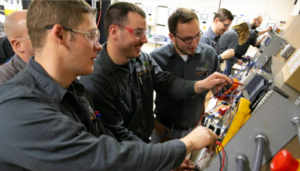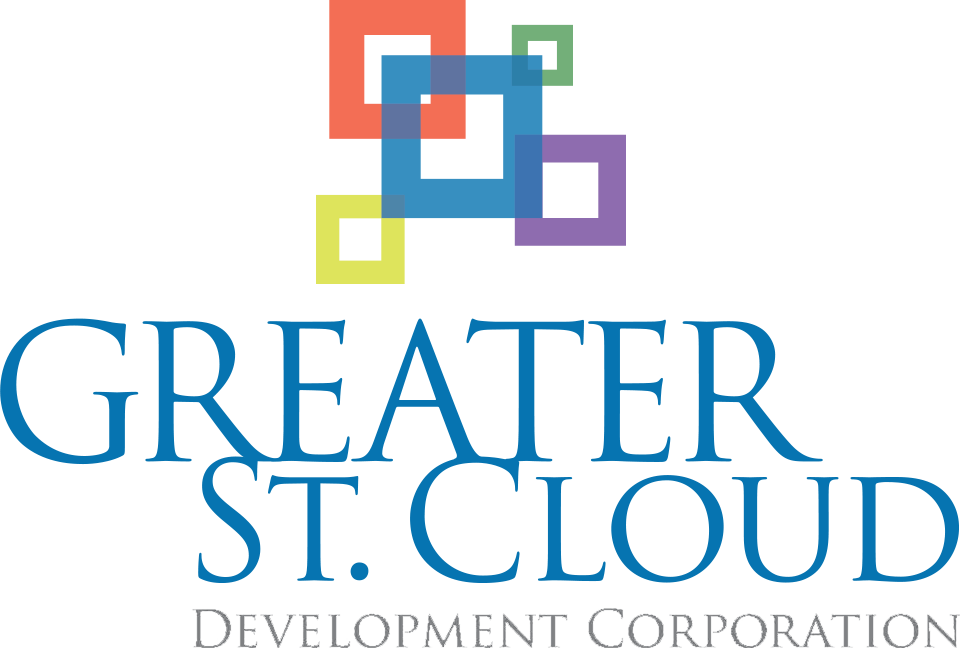Because Millennials average 2 years, 9 months at a job…
STRATEGIES FOR BUILDING ENGAGED LEADERSHIP PRESENTED AT GSDC EXECUTIVE ROUNDABLE

It’s hard to say which news was most startling at the GSDC Executive Roundtable session in Mahowald Insurance Agency’s funky new conference room on September 13. Was it that by 2025 more than 75% of the U.S. workforce will be Millennials and Gen Z, that the average time a Millennial spends at a job is two years and nine months, or that 60% of Millennials are currently thinking of switching careers?
What wasn’t startling is that more than 20 GSDC Corporate Level investors received great information about how to better understand and accommodate the generation that will soon be leading our companies. With this meeting recap, you may be able to better prepare as well.
Clare Richards, co-founder of St. Cloud’s Impacks, LLC, began the 90-minute session with a presentation on “Building and Retaining Engaged Leadership.” She described how employers can “crack the code” to finding, motivating and creating engaged young leaders.
“What we aren’t going to do today is focus on how all the other generations suck,” she joked. “That’s not productive, because we can’t course-correct an entire generation. Instead, we have to find ways to bridge that divide.”
She said the first step is knowing that Millennials, the group currently 26 to 41 years old:
-Entered the workforce during the job uncertainty of the Great Recession, so there’s a lack of trust in their employers.
-Have crippling debt and reduced income. When comparing 20 to 30 year olds from the 1980s and the 2010s, Millennials earn 20% less than Baby Boomers, when adjusted for inflation.
-Grew up with technology, which helps them be more entrepreneurial.
-Were the first to embrace social media, which unfortunately trained them to care what strangers think about them. This has caused them to be more sensitive to criticism from employers.
-Are focused on outcomes, not input. In other words, Millennials don’t feel someone should work 40 hours when the tasks can be completed in 25.
-Are not engaged at work. According to Gallup, 55% of Millennials fall into this category.
-Have an attention span of 12 seconds, according to the Internet Ad Bureau.
With all this information that’s still admittedly foreign to many of us, how does a company attract and retain top talent? How can a business owner ensure the legacy of their business by putting the right people into leadership roles, and avoid turnover?
Richards cited a survey she conducted earlier this year that found the most important factors for Millennials were meaningful work, emotional fulfillment and work/life balance. Compensation was also important, but not the most important.
“Another employer will always be able to outspend you on talent,” said Richards. “But you can retain and attract staff if achievement, purpose, respect and other important aspects are included.”
In that survey, one respondent said what motivated them was, “Feeling connected to my team, positive feelings of self-worth and contribution among achievement.”
Richards said an important strategy for employers to embrace is to give employees opportunities for various levels of achievement. That could even include what she called gamification, the process of adding games or game-like elements to something to encourage participation.
Levels of achievement also include making sure employees know the various possibilities they have for moving up in an organization. Richards referred back to that statistic about how Millennials spend an average of two years and nine months on a job.
“Don’t expect to take every employee from A to Z in their career, because they might not be there that long,” she said. “But taking them from A to F, or A to L, will be good for them and for your company.”
The Executive Roundtable agenda then shifted to a discussion led by Mary Swingle, President and CEO of the Boys and Girls Clubs of Central Minnesota. She asked a panel of three young professionals – consisting of Brady DeGagne, Director of Programming for the Boys and Girls Clubs; Lacey Schirmers, Executive Director of GREAT Theatre; and Lacey Solheid, Associate Talent Development Partner for Blattner Company – to share what kinds of employer support have proven beneficial to them.
They said they appreciated that their bosses allowed and encouraged them to volunteer in the community “on the clock,” helping them meet and learn from other leaders. In some cases, employers suggested such opportunities to them, but even when the employees needed to identify such opportunities on their own, they appreciated their employers’ encouragement.
It wasn’t just moderators and panelists who spoke during the Executive Roundtable, though. The 20-plus investors who took part came armed with questions and ideas, especially when the conversation turned to giving their staffs flexibility and autonomy.
One employer said their company has a 100% work-from-home option, although employees can come into the office if they wish. However, that company has also created a flexible work agreement that stipulates it has to provide employees the tools and opportunities to succeed, while the employee has to agree to such things as spinning their computer camera around if asked, to confirm they’re indeed working and not on some beach.
Others in the session said they also have agreements with employees so that everyone is on the same page regarding flexibility and autonomy.
Another participant said they have employees who prefer to work in the office rather than from home, because the office serves as part of their social life. He said those employees tend to be younger and single.
Other comments shared related to flexibility and autonomy included:
-Ensuring employers don’t over-manage. Describe to each employee what you’re trusting them to do, then allow them the opportunity to fail in front of a client. The employee will grow from it and so will your company.
-Nurturing employee growth differently for each person. Especially motivate those you can see as being visionaries.
-Realizing some employees would make good people managers, while others would thrive as visionaries, then ensure these talented people get into the roles best suited for each. One employer said they have several employees try different roles to see which is the best fit.
-Realizing some companies or industries are able to offer flexible hours (three 12-hour days, perhaps), while industries such as manufacturing may offer limited flexibility, making it harder to attract employees for certain positions.
-Automating “busy work” when possible, so employees can work at a higher, more-engaging level.
-Reminding employees that lateral moves can be good, because they learn new aspects of the company that give them additional ways to move up.
-Realizing college degrees aren’t a predictor of success. Having a BA, MS, PhD or other letters at the end of a name isn’t as important as what an employee turns that degree into. (One participant encouraged employers to read the book “Generation Z Goes to College.”)
The Executive Roundtable session concluded with Richards challenging employers to teach their employees the “Why?” of exploring opportunities and saying yes to requests. She had a slide on the screen that showed how saying yes leads to connection, which leads to opportunities and growth, which lead to legacy.
“Help young people connect the dots, help them see their potential,” said Richards. “This will help you crack the code to finding, motivating and creating engaged young leaders.”
The GSDC thanks Clare Richards and Mary Swingle for their presentations; panelists Brady DeGagne, Lacey Schirmers and Lacey Solheid; and the Mahowald folks for letting us use their conference room.
The next GSDC Executive Roundtable will about supply chain issues, from 8:00 to 9:30 a.m. Wednesday, October 26, in the American Heritage Bank conference center. Then in November, we’re planning another Executive Roundtable on Mental Health & Wellbeing. If you’re interested in participating, please contact GSDC President Patti Gartland at 320-252-5228.
3 WEST CENTRAL MN COMPANIES PICKED FOR BETA PROGRAM
![]()
BETA, a Minneapolis organization that provides Minnesota-based founders from top tech startups with the resources and relationships required to scale their business, has chosen three St. Cloud companies for its five-month Fall 2022 Cohort.
Babbl produces a website that tracks stock market news sentiment; Impacks is a tech powered company that simplifies the way parents and educators access critical school supplies for students; and Talknician uses augmented reality to efficiently transfer knowledge within the industrial workforce.
These companies are alumni of St. Cloud’s ILT Academy, which is committed to assisting 2,500 “underestimated” innovators and entrepreneurs in Greater Minnesota. “ILT Studios’ programming is provided via the Launch Minnesota’s Fastlane 94 coalition, whose efforts are coordinated by GSDC.
GSDC’S GAIL CRUIKSHANK TALKS JOBS ON WJON

Many GSDC investors tune in to WJON radio’s “Get a Job” segment at 8:15 a.m. the third Monday of each month to hear host Jay Caldwell talk with GSDC Talent Director Gail Cruikshank about all things talent and jobs. These conversations are a great opportunity to highlight key leaders collaborating on ways to ensure strong connections between job seekers and our local employers.
If you haven’t yet heard their show and benefited from the tips Gail provides, here’s a link to the September 19 edition, which runs 12 minutes.
FINAL DUAL ENROLLMENT LISTENING SESSION – SEPT. 28
St. Cloud State University and St. Cloud Technical and Community College are hosting their third and final community listening session on September 28 to garner feedback on the potential impacts of alternative dual enrollment structures that focus on equity in Minnesota.
The sessions have a specific focus on historically marginalized learners to understand their perspectives on Minnesota’s dual enrollment programs and solicit ideas for improvement.
You’re invited to attend virtually or in person at the Miller Center from 5:30 to 6:30 p.m.
Register here.
SCTCC TRAINING LAB GROUNDBREAKING – OCT. 5

St. Cloud Technical & Community College (SCTCC) is excited to announce that the groundbreaking for the Advanced Manufacturing Training Lab will be held on Wednesday, Oct. 5 at 1 p.m. on the SCTCC campus.
SCTCC was awarded a $2.5 million grant from the U.S. Dept. of Commerce’s Economic Development Administration in 2020 to develop the lab. The College has committed matching dollars to the project, which is expected to be complete in 2023.
The Advanced Manufacturing Training Lab at SCTCC will expand and renovate current space, install state-of-the-art equipment, and create a learning environment for students that will mirror their experience while working in industry. The programs that will benefit from the lab include: CNC and Advanced Machining; Computer-Aided Design Manufacturing; Computer-Aided Mechanical Design; Energy & Electronics; and Welding/Fabrication.
“This grant provides critical funding to help SCTCC meet the needs of our students and the greater St. Cloud community,“ said Interim President Kloos. “The College is excited to enhance the student experience through updated technology and expanded access. We look forward to continuing to serve as a key component in the region’s manufacturing industry and providing an improved experience for SCTCC graduates entering the workforce and advancing an essential economic sector.”
In addition to improved facilities for SCTCC programs, the lab will expand training opportunities for those currently in the workforce, which will support the creation and retention of high-quality, in-demand jobs throughout the St. Cloud region, particularly for unemployed and underemployed.
“SCTCC is central to our ability to maintain and grow our business, thereby ensuring an ability to maintain our employee base of roughly 1,000 people,” stated President and COO Greg Flint of Coldspring. “In order to continue with the momentum that we’ve developed, we support the increased training capacity that the new space will offer and the possibilities for our current and future employees to learn advanced skills on updated equipment. It’s vital!”
The Advanced Manufacturing Training Lab will leverage regional assets and support the implementation of regional economic development strategies designed to create jobs, leverage private capital, encourage economic development, and strengthen the region’s ability to compete in the global marketplace.
The groundbreaking for the Advanced Manufacturing Training Lab will include a short program at 1 p.m. with comments from Minnesota State Chancellor Devinder Malhotra and St. Cloud Mayor Dave Kleis. Park in Lot A and enter Door 6. Campus maps can be found at sctcc.edu/maps.
CHILD CARE FAIR – OCT. 11

On October 11, the United Way will be hosting a Child Care Fair at the American National Bank from 7:30–9:00 a.m. Businesses, organizations, and employers are invited to this free event. Updates about the state of child care availability in Central Minnesota, and how it affects local businesses, will be presented. Connect with other businesses who are finding creative solutions to the local child care crisis.
Register here.
# # # # #
Sign up to receive SHINE ON, a monthly email highlighting all the good happening in Central MN. Click here to view the Shines Stories collection.
Would you like to receive our Developing News Updates? Subscribe here.
Contact Our Staff Team
Patti Gartland, President
pgartland@greaterstcloud.com | 320.260.2442
Leslie Dingmann, Business Development Director
ldingmann@greaterstcloud.com | 320.493.9003
Gail Cruikshank, Talent Director
gcruikshank@greaterstcloud.com | 320.260.6775
Tammy Campion, Communication & Programs Specialist
tcampion@greaterstcloud.com | 320.252.5185
